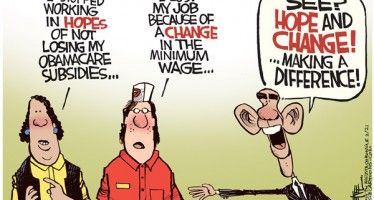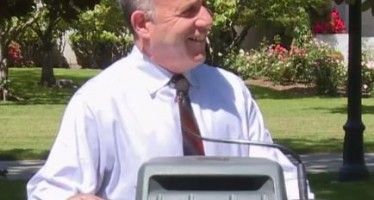Brown's Tax Election Stalling
BY JOHN SEILER
A couple of days ago it seemed as though Gov. Jerry Brown had the needed GOP votes to slate a Special Election for June on increasing taxes. Now it seems he doesn’t. His deadline for a deal is Thursday.
Later than that, and an election might have to be scheduled for July. The problem there is that the sales tax and other taxes imposed in 2009 expire on July 1, making it hard to claim that the tax increases are mere “extensions” of earlier taxes. (The 2009 income tax increase already expired last January.)
The question remains whether the governor can peel off four Republicans, two in each house, to join every Democrat for a 2/3 majority in each house of the Legislature. Brown, reportedly, has been unable, or unwilling, to meet GOP demands for reforms on pensions, budget limitations and other issues.
Yesterday, five senators released a letter outlining their problems in negotiations with Brown:
We accepted your invitation to bring you our ideas on important structural reforms and willingly took to heart your admonition ‘to get out of our comfort zone.’ Although it is clear that you engaged in our conversations seriously, it appears we have reached an impasse in our discussions about how to move the state forward.
Economic Developments
More is be at work here than the usual budget wrangling; or the typical Democratic search for a handful of GOP legislators to break ranks and help increase taxes.
A lot has happened since Brown’s call, now two months ago, for a vote on $12 billion in tax increases. And the call by Brown, Democratic legislators, big-business Chamber of Commerce types and almost all media pundits to “let democracy work” is ringing hollow as events develop in the real world of the state economy.
Last Friday, federal numbers showed that the U.S. unemployment rate had dropped from 9.0 percent in January to 8.9 percent in February. It’s down almost a full point from the 9.8 percent of last November.
Yet California’s unemployment has barely budged, down to 12.4 percent in January from 12.5 percent in December. Last November, in California the rate also was 12.5 percent. And for all of 2010, the average was 12.4 percent.
So, while the rest of the country is enjoying at least a modest recovery, California is stagnating.
Which means that California’s real budget problem isn’t a lack of revenue from taxpayers, but the lack of jobs creation by businesses. And all schools of economics, whether liberal or free-market, stipulate that the worst thing to do in a recession is to increase taxes.
Even President Obama conceded that logic last December when he agreed to extend President Bush’s federal tax cuts another two years.
Other news has been breaking. Just yesterday, state Controller John Chiang, a Democrat just re-elected last November, came out with a stinging critique of redevelopment agencies. Brown already has called for eliminating the $1.7 billion in the budget going to redevelopment.
In turn, redevelopment backers are gearing up potential legal challenges to the potential elimination of their gravy train. However, if there is no tax increase, and the state must find an additional $12 billion in cuts, then the pressure to cut anything and everything will be so great that redevelopment will be left as road kill no matter what the courts decide. In a crisis of this magnitude, both laws and the state constitution can be changed — or ignored.
More Waste and More Waste
Meanwhile, the state’s newspapers, possibly sparked by the popularity with readers of last year’s Bell scandal, have been digging up all sorts of waste in government.
I blogged about the Los Angeles Times’ stellar series on the fathomless waste in a $5.7 billion bond for the Los Angeles Community College District here and here. The series found the bond spending rife with “poor planning, frivolous spending and shoddy workmanship.”
Although that scandal and waste concerns a local bond measure, the LACCD obviously gets hundreds of millions in funding from state taxpayers. How badly is it spending state tax money? And how many other community college districts — and Cal State and U.C. and high school and other districts — have such a degree of waste?
Today the San Francisco Chronicle reported on yet another scandal:
California prison guards and their supervisors have racked up 33.2 million hours of vacation, sick and other paid time off – an astounding accumulation that amounts to nearly half a year per worker.
It also adds up to a $1 billion liability for taxpayers of the deficit-plagued state.
So that’s another billion wasted. As old Sen. Everett Dirksen quipped years ago, “A billion here, a billion there, pretty soon, you’re talking real money.”
Indeed, you only need to count up to 12 billion simoleans in waste that could be cut to comprise the $12 billion tax-increase request.
Then there’s the Big Enchilada in the room: Pension reform. So far, Gov. Brown has announced no significant reforms that would reduce current and future pension hits to the state budget.
A key vote — an actual democratic action, such as that demanded by the tax increasers at the state level — will come today in Los Angeles. According to Ballotpedia, Measure G:
if approved by voters, will reduce the city’s costs for the pension and retirement healthcare plans for newly hired police officers and firefighters. The ballot question does not apply to the pension plans or retirement healthcare costs of existing police officers and firefighters….
The city’s police and firefighter unions have agreed to that plan and Mayor Villaraigosa supports it.
The only major objection is by those who say Measure G doesn’t go far enough, and that pension reductions also are needed for police officers and firefighters currently on the job. But a huge expected endorsement from voters for Measure G would push future reforms forward.
The Little Hoover Commission came out with a report 10 days ago recommending large cuts in pensions, including for current workers. “Frankly, I just don’t see this happening,” huffed state Sen. Alex Padilla, D-Los Angeles.
But the report still resonated across the state as a sober assessment of a major problem causing budget havoc. As Contra Costa Times columnist Daniel Borenstein wrote:
CALIFORNIA’S PUBLIC employee pensions, the most generous in the country, will strangle funding for needed public services unless officials reduce future retirement benefit accruals for current workers.
That’s the well-reasoned conclusion of the Little Hoover Commission, a bipartisan watchdog group whose current members were appointed by the state Legislature and former Gov. Arnold Schwarzenegger. “The situation is dire,” commissioners reported Thursday following a yearlong investigation. “State and local governments have made a promise to workers they can no longer afford.”
Voter-taxpayers also are realizing they can’t afford it, either.
As the drama over whether or not to have a June tax-increase vote plays out in the coming days, reality, finally, may be peeking out like the California sunshine after a long rain.
John Seiler is CalWatchDog.com’s managing editor: [email protected]
Related Articles
SD's Chance to Erase Pension Abuse Image
APRIL 5, 2011 By STEVEN GREENHUT The city of San Diego has long been the poster child for pension abuse,
The impacts of raising San Francisco’s minimum wage to $15
On Nov. 4 San Francisco voters are being asked to approve Proposition J, a measure which increases the minimum wage
Sen. Steinberg dumps carbon tax idea
State Senate President Pro Tem Darrell Steinberg, D-Sacramento, has given up on his plan to replace California’s cap-and-trade law with a carbon





